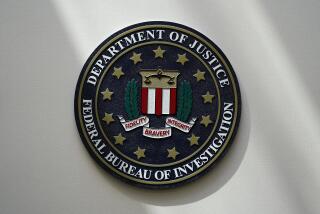Spy Case ‘Very Serious’--Bush : Reports Against Envoy ‘Tragic’ if True, He Says
- Share via
WASHINGTON — President Bush said today that reports that a former top diplomat in Vienna may have spied for the Soviets are “very serious,” but he does not have an assessment of potential damage to the United States.
“I have known about this matter for some time and the minute I heard about it I was aggrieved because it is a very tragic thing should the allegations be true,” Bush told reporters in commenting for the first time on Felix S. Bloch, who is under investigation by the FBI.
The President refused to reveal details of the case, noting that the investigation is still under way. But he said: “Any time a person is . . . allegedly involved in something like betraying his country, that to me is a very serious matter.”
Possible Damage
Asked about possible damage to U.S. security, Bush, a former CIA director, replied: “I don’t think anyone could give you a full damage assessment” at this time. He added that the case, if true, “doesn’t help” to further better relations between the superpowers, even though everyone knows that “espionage goes on.”
White House spokesman Marlin Fitzwater said Secretary of State James A. Baker III informed Bush of the Bloch investigation “within minutes after he learned of this.” He declined to say when that was.
Asked why Bush commented on a case still under investigation, Fitzwater replied, “We normally don’t have a situation like this.”
The President’s remarks came as Bloch’s one-time superior, former U.S. Ambassador to Austria Ronald Lauder, said he “did not like” Bloch. “There was something about him that bothered me,” Lauder said on ABC-TV’s “Good Morning America” program.
‘Something . . . Wrong’
Lauder, now a Republican candidate for mayor of New York, said, “The more I got to know him, the more I realized there was something dramatically wrong.” He said he had Bloch, who was second-in-command for most of his seven years at the Vienna embassy, recalled in July, 1987, because of “insubordination.”
But the former director general of the Foreign Service, George S. Vest, was quoted today as saying, “It was time for (Bloch) to go, anyway, so we brought him back. He was not pulled back prematurely.” Vest said Bloch returned to attend a seminar for top diplomats.
Stansfield Turner, who was CIA director during the Carter Administration before Bloch’s embassy stint, said “it’s not very likely (Bloch) would know the specific names and details” concerning CIA agents in Vienna because such information is not normally shared with officials outside the agency.
However, a person in Bloch’s high position “could have gotten into things that weren’t normally his business” because of his access to the embassy’s cable section, Turner said on “Good Morning America.”
The Wall Street Journal reported in today’s editions that Bloch helped shape the State Department’s policy on transfers of sensitive technology to the Soviets and actively participated in the decision earlier this year to relax U.S. policy on transfers.
More to Read
Sign up for Essential California
The most important California stories and recommendations in your inbox every morning.
You may occasionally receive promotional content from the Los Angeles Times.












